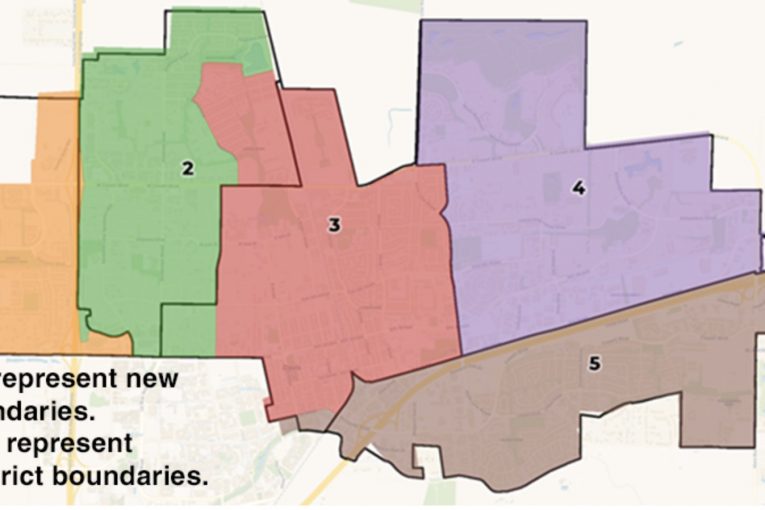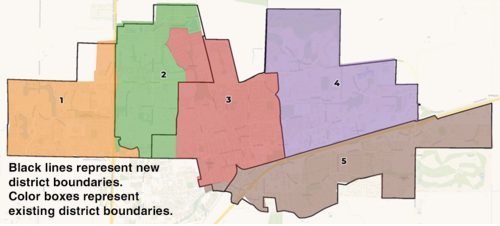

By Melanie Johnson
DAVIS, CA – On Tuesday night, the Davis City Council discussed new revisions made to the 2022 city redistricting map and unanimously approved its revised version, available on their website.
City Manager Kelly Stachowicz detailed the most recent changes to the map and specifically addressed the most impactful of those changes, one of which is the slight shrinking of district 5 encompassing all of South Davis, and the subsequent incorporation of Aggie Village into district 3.
Stachowicz elaborated on the reasoning behind this decision, “That was almost entirely the bulk of the public comment and response that we received throughout this process . . . Folks in Aggie Village really felt like they were a community of interest that had more in common with the downtown area than with the rest of district 5.”
Stachowicz also discussed the minimization of voting deferrals, which was another major factor considered in the redistricting process.
As clarified by Stachowicz, voting deferrals refer to “the number of folks who don’t get to vote for another two years and didn’t get to vote this past election” due to the sequencing of district elections. Davis residents in a district that was not assigned to vote in 2020, who are incorporated through the redistricting process into a district that is not assigned to vote in 2022, could be effectively excluded from voting in city council elections for years on end.
Stachowicz stated that throughout this process, city staff “worked pretty hard” to “minimize the number of people who would be deferred.”
According to her, “that number has been minimized to about 69 people. There are some folks who will get to vote again because they’re moving from a district that voted in the previous 2020 election and they’ll get to vote again in 2022.”
Overall, she stressed that, “for the most part, as per council interest and seemingly community interests as well, we really tried to stick with the existing districts as much as possible. The changes that took place really were changes for population adjustments.”
Only one public commenter provided their perspective on the matter, expressing their support for the new district lines.
He commented, “I am generally in favor of this final map. I also, like many of the council members, care much more about deferrals than accelerations and want to minimize the number of deferrals.”
With regard to the move of Aggie Village from district 5 to district 3, the commenter stated, “While I enjoyed having Aggie Village in district 5, which is my district, I also think that it makes a lot more sense in district 3, so I support moving it into district 3 as well.”
Following the public comment period, Vice Mayor Lucas Frerichs addressed some final concerns regarding the changes between districts 3 and 5, primarily in response to comments that, “because district 5 is going to be the smallest district by population, that we are somehow attempting to punish South Davis.”
He stressed that these concerns do not accurately reflect, “what the redistricting process is about.”
Frerichs emphasized that “We heard loud and clear many times over the past several years prior to us switching to district elections, but also even since having switched to district elections, that folks in South Davis were really happy to have their own district that encompassed primarily South Davis. There just happens to be less people in a nearly entirely South Davis district.”
Frerichs finally added that “there are no perfect lines and perfect maps. There are definitely going to be changes in years to come as well, some of which make perfect sense and others may not make exact sense.”
He also reinforced that while council members “may officially be representing the individual districts,” they ultimately “have a commitment to the entire community.”
These revised district lines will be in place for the November 2022 city council election and will stay in place until the 2030 census.

The problem is less about the ability of a few hundred people not being able to vote for years, the real problem is all of us unable to vote for all the candidates every election, and Minimum Rexrod.